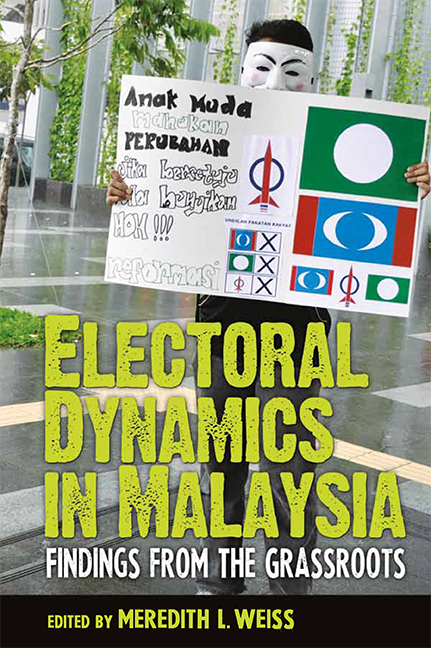Book contents
- Frontmatter
- Contents
- List of Tables
- Foreword
- Acknowledgements
- Glossary & Acronyms
- Chapter 1 Introduction: Patterns and Puzzles in Malaysian Electoral Dynamics
- Chapter 2 Arau, Perlis: The Irresistible Charm of Warlords, Women and Rewards?
- Chapter 3 Padang Serai, Kedah: Between the ‘Personal Touch’ and the Generous Hand
- Chapter 4 Kuala Nerus, Terengganu: New Malay Politics?
- Chapter 5 Balik Pulau, Penang: Home Run for the Home Boys
- Chapter 6 Lumut, Perak: Patronage, Clientelism and the Post-Coup Order
- Chapter 7 Kuantan, Pahang: Revealing the Ordinary
- Chapter 8 Pandan, Selangor: New Electoral Dynamics in Urban Malaysia
- Chapter 9 Kepong and Titiwangsa, Kuala Lumpur: Messages or Money?
- Chapter 10 Rembau, Negeri Sembilan: Personalities and Promises
- Chapter 11 Pulai, Johor: A Tale of Two Coalitions
- Chapter 12 Gelang Patah, Johor: Did Lim Kit Siang Truly Win His Last Gamble?
- Chapter 13 Kota Marudu and Keningau, Sabah: Personality, Patronage and Parochial Politics
- Chapter 14 Tuaran, Sabah: Party Loyalty and Rational Voting
- Chapter 15 Kota Kinabalu, Sabah: BN Loses Its ‘Fixed Deposit’
- Chapter 16 Beaufort, Sabah: Whither Lajim's Popularity?
- Chapter 17 Sibu and Lanang, Sarawak: Defeat of the Bosses
- Contributors
Chapter 1 - Introduction: Patterns and Puzzles in Malaysian Electoral Dynamics
Published online by Cambridge University Press: 10 November 2017
- Frontmatter
- Contents
- List of Tables
- Foreword
- Acknowledgements
- Glossary & Acronyms
- Chapter 1 Introduction: Patterns and Puzzles in Malaysian Electoral Dynamics
- Chapter 2 Arau, Perlis: The Irresistible Charm of Warlords, Women and Rewards?
- Chapter 3 Padang Serai, Kedah: Between the ‘Personal Touch’ and the Generous Hand
- Chapter 4 Kuala Nerus, Terengganu: New Malay Politics?
- Chapter 5 Balik Pulau, Penang: Home Run for the Home Boys
- Chapter 6 Lumut, Perak: Patronage, Clientelism and the Post-Coup Order
- Chapter 7 Kuantan, Pahang: Revealing the Ordinary
- Chapter 8 Pandan, Selangor: New Electoral Dynamics in Urban Malaysia
- Chapter 9 Kepong and Titiwangsa, Kuala Lumpur: Messages or Money?
- Chapter 10 Rembau, Negeri Sembilan: Personalities and Promises
- Chapter 11 Pulai, Johor: A Tale of Two Coalitions
- Chapter 12 Gelang Patah, Johor: Did Lim Kit Siang Truly Win His Last Gamble?
- Chapter 13 Kota Marudu and Keningau, Sabah: Personality, Patronage and Parochial Politics
- Chapter 14 Tuaran, Sabah: Party Loyalty and Rational Voting
- Chapter 15 Kota Kinabalu, Sabah: BN Loses Its ‘Fixed Deposit’
- Chapter 16 Beaufort, Sabah: Whither Lajim's Popularity?
- Chapter 17 Sibu and Lanang, Sarawak: Defeat of the Bosses
- Contributors
Summary
Compared with the robust field of studies of electoral politics in neighbouring democracies such as the Philippines or Indonesia, the state of this field in Malaysia is weak at best. A handful of exemplary works (most recently, the massive Puthucheary and Norani 2005) detail and assess the workings of the electoral system, and each general election (GE) unleashes a flurry of analyses of who voted how, why and with what significance for the polity. Most of these studies rely on aggregate, often quantitative data – primarily polling results – or trace developments in a single constituency or state (for instance, Welsh 2004; Brown 2005; Loh 2003). Surveying across such works, the consensus seems to be that electoral dynamics have changed in Malaysia since at least the late 1990s: that old patterns of communal (ethnic) voting have given way to developmentalist, Islamist or other priorities; that the rise of new media have altered processes of voter mobilisation; and that the perennially dominant Barisan Nasional (National Front, BN) coalition faces stiffer opposition than ever before. The explanations for these shifts vary, but centre usually around either the character or concerns of specific ethnic communities (e.g., the rise of ‘modern’, aware ‘new Malays’ or Chinese and Indian resentment against pro-Malay preferential policies and Islamisation); economic downturns or manifest corruption and inefficiencies; a generational shift as ‘wired’ youths, unaware or unappreciative of the BN's past achievements, flock to the polls; or less readily explicable patterns, such as an apparent urban–rural divide. And yet, generalisations are difficult.
This book charts new ground by presenting qualitative, constituency-level data, allowing not just nuanced explanation, but comparison across Malaysian states and regions. As such, the work offers evidence with which to weigh the merits of conflicting theories of Malaysian political behaviour: of whether communalism still determines political preferences, of how much the BN relies upon targeted developmental spending or discretionary payments, of whether urban and rural or young and old voters value different attributes in their representatives, of whether appeals to good governance win votes. Most common explanations prove too simplistic.
- Type
- Chapter
- Information
- Electoral Dynamics in MalaysiaFindings from the Grassroots, pp. 1 - 16Publisher: ISEAS–Yusof Ishak InstitutePrint publication year: 2013

